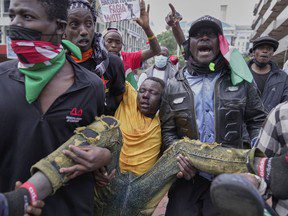The number of fatalities from Wednesday’s nationwide protests in Kenya has increased to 16, with the majority reportedly killed by police, according to Amnesty International. The demonstrations, which spread across major cities, were marked by widespread unrest and allegations of excessive force by security personnel.
Tensions escalated across the country as thousands of demonstrators took to the streets, voicing their frustration over a controversial tax proposal that had previously ignited mass protests. The latest demonstrations were also held in remembrance of last year’s protests, during which more than 60 people lost their lives.
Eyewitnesses and local media outlets reported chaotic scenes in the capital city of Nairobi, where security forces were seen deploying water cannons and tear gas in efforts to disperse the crowds. The response by law enforcement has drawn sharp criticism from human rights advocates and civil society groups.
Thank you High Court of Kenya, for lifting the ban on reporting.
Ruto will not be allowed to murder our people in silence.
Why does he not want the world to see what is going on in Kenya? pic.twitter.com/Gk0ykhH1Dm
— Sahel Revolutionary Soldier (@cecild84) June 25, 2025
In a unified statement, the Kenya Medical Association, the Law Society of Kenya, and the Police Reforms Working Group confirmed that several individuals sustained gunshot wounds during the protests. Their statement underscored the severity of the injuries suffered by demonstrators.
“Of those injured, several had suffered gunshot wounds,”
the joint statement read, highlighting concerns over the use of live ammunition against civilians.
While the controversial tax hike that initially sparked the protests was withdrawn by President William Ruto, anger persists regarding the actions of security forces. Protesters argue that their right to demonstrate is being met with disproportionate violence, eroding public trust in state institutions.
The protests were not only driven by economic grievances but also by growing outrage over alleged police brutality. Earlier this month, Kenya witnessed further demonstrations after a prominent blogger died while in police custody, fuelling accusations of misconduct within the law enforcement system.
According to Amnesty International, police conduct during Wednesday’s protests contributed significantly to the rising death toll. The organisation has called for accountability and restraint from security forces, urging authorities to respect the rights of protesters.
“Most of the dead were reportedly killed by police,”
Amnesty International stated, prompting renewed calls for independent investigations into the handling of the protests.
The scale and intensity of the demonstrations reflect deep-seated frustrations among ordinary Kenyans, many of whom face mounting economic hardship and perceive government actions as detached from public needs.
Despite the withdrawal of the tax proposal, demonstrators continue to demand reforms, including greater police accountability and protection of civil liberties. The government’s response to these demands will likely shape Kenya’s political landscape in the months to come.
The international community has also been monitoring the situation closely, with human rights groups warning that unchecked violence could undermine democratic principles in the East African nation.

















